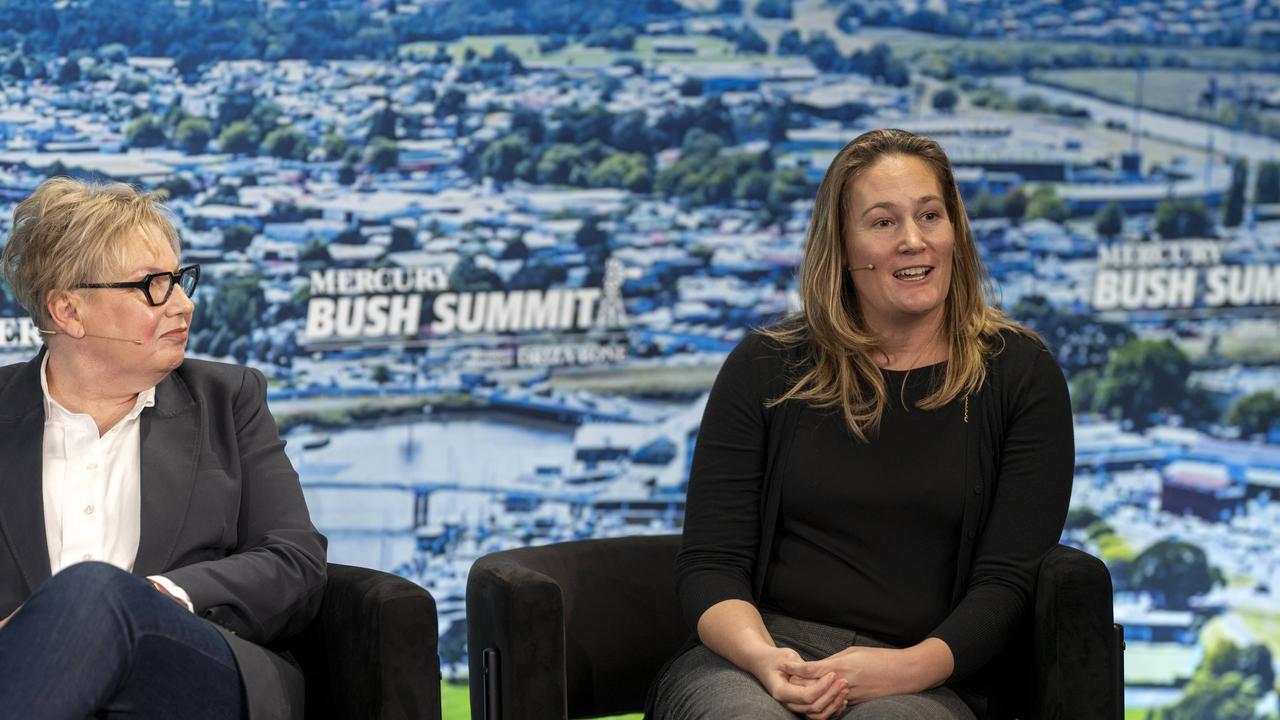Mercury Bush Summit told of Rural GPs stopped from practising here, who flies to Thursday Island to fill shifts
Rural GPs are having to fly interstate for shifts because a health policy stops them from using skills in Tassie hospitals.
Bush Summit
Don't miss out on the headlines from Bush Summit. Followed categories will be added to My News.
Rural GPs with the skills to also fill positions in Tasmania’s hospitals are instead flying interstate to cover shifts.
The GPs, known as rural generalists, have had extra training and experience to provide services such as obstetrics and other specialties.
While every other state allows rural generalists to help fill shifts in state hospital systems, there are 60 of these GPs in training whose skills are yet to be widely recognised in Tasmania.
Many face the absurd situation where they are flying interstate to work in regional and remote hospitals. One even flies to Thursday Island, some 3420km away to run obstetric clinics because she cannot provide the same service 20 minutes from her home on the North West Coast.
The barriers are contributing Tasmania’s GP shortage, says Australian College of Rural and Remote Medicine Regional Director of Training Sally Street.
She said the situation was frustrating.
Dr Street appealed to health authorities to change the rules at the Mercury Bush Summit on Tuesday.
“The difficult thing for us is we are doctors who like to work across primary and secondary care,” Dr Street said.
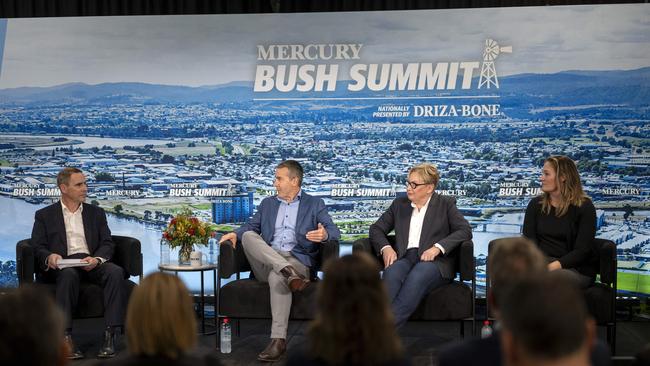
“We get great satisfaction from that, and we know it’s a great way to provide care and a great way to receive care.
“We do need those opportunities in secondary care, and opportunities like that exist for us in every state except for Tasmania.
“I think a lot of the amazing rural doctors who I have here at the moment will be leaving for the mainland, and a lot already have.”
Dr Street said there were 60 GPs training to be rural generalists but most would be forced to leave the state.
Dr Street, is herself an experienced rural generalist who works as a GP and obstetrician.
“This year, and most of last year, I did my obstetric work and my clinical work up on Thursday Island – which is a very long way from Tasmania.
“But if I can’t be here, at least I can be there looking after women in the Torres Strait Islands.”
Dr Street said rural generalists were being employed more widely in Tasmania’s emergency departments but other areas were off limits.
“We need heath service leaders to say yes and lead with courage through any challenges,” she said.
The Tasmanian Health Service was approached for comment, but a spokesperson said they could not respond in time for deadline.
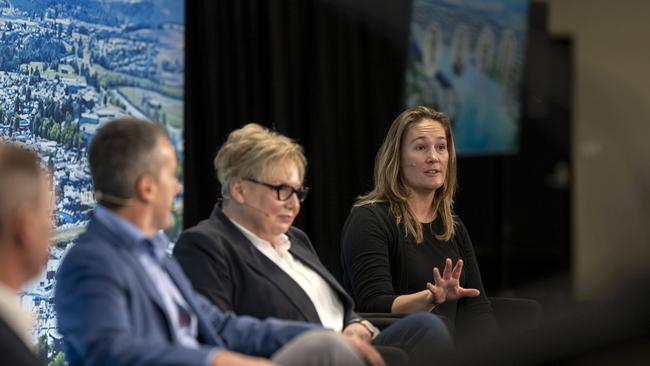
Mercury Editor Craig Herbert released a communique after the Bush Summit which included a call for the state government and health services to formally recognise rural GP generalists to work in Tasmania in primary and secondary care.
Now in its second year, the event featured speakers such as AFL legend Jack Riewoldt, Premier Jeremy Rockliff, Labor Leader Dean Winter, Launceston Mayor Matthew Garwood, Hancock Agriculture and S Kidman & Co CEO Adam Giles, and other guests.
At the conclusion of the event, the Mercury formally unveiled its Bush Summit Communique, which outlined six key issues that the publication wanted both state and federal governments to address.
One of those was for the state government to extend the funding formulae from three to six years to provide more certainty for planning the provision of critical mental health services in rural and regional areas, such as those provided by Rural Alive and Well.
RAW CEO Lee Whiteley told the summit that the organisation used the “fast five” principle as a barometer of a regional community’s success.
“A thriving community is one where people have a clear mind, they have a positive mood, and they are connected to their family and friends.,” Mr Whiteley said.
“They have meaning; they know how to refocus their life, to have meaning in their life, and they know how to stay active and how to rest or eat well.
“We think that if people practise those things, and that’s a regular conversation we have in regional communities, that they will be thriving individuals.
“And when individuals thrive, then their communities thrive.”
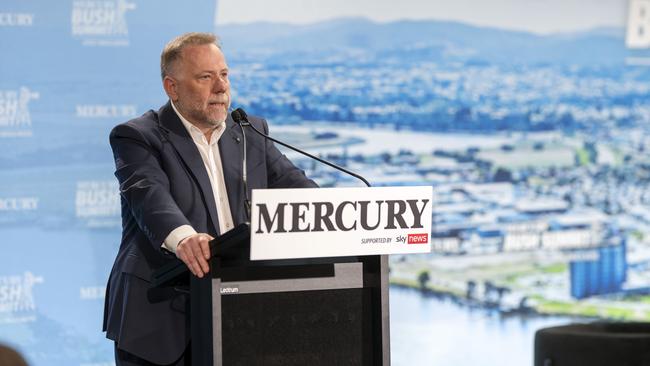
Dr Street also said that childcare was a significant issue in rural and regional areas and another of the communique points calling on the federal government to be more flexible in providing childcare rebates for families.
“The traditional options were not usually available, but what often would be available would be things like au pairs or using nannies, or being able to employ young people from the town who were studying early childhood education.
“But the rebates that applied for the traditional childcare options we couldn’t actually access.”
In his closing remarks, Mr Herbert said that more work was needed to address all the issues discussed at the event.
“There is a lot to be done from today. This is not the end of the whole Bush Summit from this point on,” Mr Herbert said.
“This is just where the rubber hits the road for us.”
Rockliff’s battle cry for salmon industry
Tasmanian Premier Jeremy Rockliff used his speech at the Mercury Bush Summit in Launceston to urge the federal government not to shut down salmon farming in Macquarie Harbour.
In his first public appearance since Deputy Premier Michael Ferguson relinquished his role as infrastructure minister, Mr Rockliff said that he was concerned that Strahan would follow the fate of former hydro and mining ghost towns of Tarraleah, Waddamana and Gormanston.
“We simply cannot let history repeat itself,” he said.
Federal Environment Minister Tanya Plibersek is reviewing existing aquaculture permits granted in the harbour, following a push from environmental groups that believe aquaculture activity in the area is contributing to the declining population of the endangered Maugean skate.

A delegation of Tasmanian aquaculture industry figures and other relevant stakeholders met Ms Plibersek one-on-one earlier this month.
Mr Rockliff said “each left their meetings concerned that an adverse decision was imminent”. “I’ve since spoken with the Prime Minister to urge him not to allow decisions to be made that will destroy Tasmanian jobs and Tasmanian communities to appease some voters in Sydney and Melbourne. We cannot allow Canberra to shut down our aquaculture industry and Macquarie Harbour.”
Mr Rockliff said hundreds of jobs in the North West, including the “epicentre of Strahan”, would be gone if the industry was stopped.
“One in three jobs there are directly linked to salmon operations. More than half the kids at the primary school are from salmon families. The impact will be catastrophic. That town will never be the same again.”
“We’ve got to wake up and realise the importance of these jobs in rural and regional Tasmania, and not strike from the red pen because it might appease people that are more comfortable in the bigger cities around this country.
“Enough is enough, and that’s why you see workers from salmon and all these industries standing up for their jobs, their families, their local schools, their local health services.
“Listen to them; not the focus groups, but the people doing it tough in rural and regional Australia and the jobs under threat in our home patch here in Tasmania.”
Jack’s AFL team trip sparks a state of pride
He might consider himself a city boy, but AFL legend and Tasmanian Football Club (culture and leadership consultant) JackRiewoldt knows the power sport can have on rural and regional communities.
On Tuesday, the Tigers great was one of the speakers at the Mercury Bush Summit in Launceston and said that the fact thatUTAS Stadium was right in the middle of the city was a literal and figurative feature in Launceston and found across mostTasmanian population centres.
“That (UTAS Stadium) is what the North Launceston Football Club has been built on,” he said.
“Young people go there to play sport, they go there to make friends, and they go there to belong somewhere.
“We’ve been lucky that we’ve travelled around Tasmania in our preliminary work for the Tasmanian Devils and that’s not toodissimilar to Queenstown; that’s not too dissimilar to St Helens and Scottsdale.
“The football club is the centre part of the community, and people come there for that reason.”
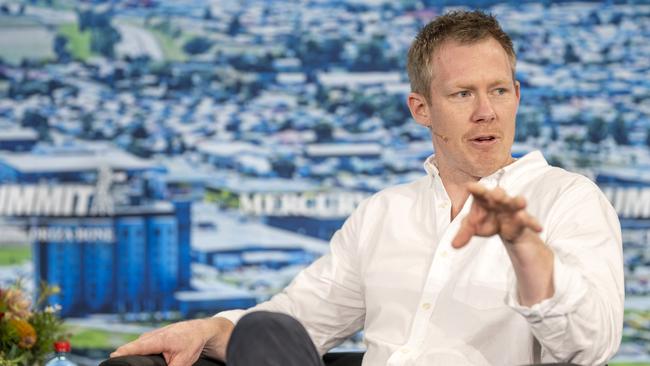
Riewoldt hoped to bring those qualities to the new club ahead of its entry into the AFL and AFLW.
“It’s about the belonging, it’s about the stories, and it’s about the journey – and that’s what people really attach themselvesto.
“So as we build the Devils for 2028 – for our young boys and girls that are going to represent us on the start of the mainstage of the AFL and the AFLW – we want to create an environment where whether they win, lose, play one game, 100 games, 300games, they come away from being involved in our organisation better people.
“We want to create better Tasmanians, whether they be from Tasmanian or flying and coming to Tasmania.”
Building the club the “Tasmanian way” was the aim for Riewoldt.
“‘On farm’ is a term I’ve heard; ‘boots on the ground’ - that is the only way to build something in Tasmania,” he said.
“If you don’t do the hard work and spend the time getting to know the people that you’re going to represent - whether thatbe from a farming industry, or whether that be as a football club – you won’t actually end up being a product that they canbelong to.”
Despite the “healthy rivalry” between different regions in the state, Riewoldt said he was proud to have a team under theone, single Tasmania barrier.
“We are the only state-based football team.
“Every other state has two teams and they’re named after a town, or they’re named after a place. We are named after Tasmania.”




